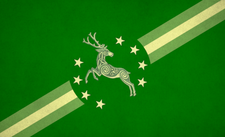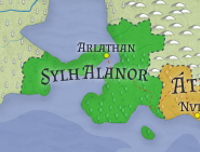Sylh Alanor: Difference between revisions
Created page with "Holder" |
No edit summary |
||
| (2 intermediate revisions by the same user not shown) | |||
| Line 1: | Line 1: | ||
{{Nation | |||
|name = Sylh Alanor | |||
|sub = | |||
|image = [[File:Ustenflag.png|225px]] | |||
|caption = Flag of the Reformation, 2017 | |||
|image2 = [[File:Alanor.png]] | |||
|region = Refugia | |||
|capital = Arlathan | |||
|language = Élvhenan <br> English | |||
|demonym = Elvhen | |||
|gov = Parliamentary Republic | |||
|office = Radhmaël/Chancellor: | |||
|leader = Silvehn | |||
|legtype = Rajelan/Head of State: | |||
|legname = Tarasyldhe | |||
|pop = 38,775 | |||
|currency = Refugi Planet (℗) | |||
|religion = The Zyqxuwy | |||
|abb = | |||
|notes = | |||
}} | |||
Sylh Alanor is a newly-reformed nation of elves in the south-central region of the Refugia Archipelago. Originally settled by the Alanori elves somewhere around 250 BCE, the forest that would take their name was cultivated and nurtured by them early on, and has grown on both sides of the strait that runs between the eastern and western portions of the nation. Prior to being invaded by the Kuviranians, Sylh Alanor had been a monarchy run by a series of High Queens, ending with Silvehn, the first Elvhen immortal, who sat on the throne between 406 CE and the Kuviranian invasion of 1880 CE. The nation is notable for its population of immortals, as well as the extreme pacifism and environmental policies of its people. After the Alanori Reformation in 2017, Silvehn opted to abdicate and work with the new generation of political minds to turn the government into a Parliamentary Republic, retiring into a role that is mostly ceremonial. | |||
Sylh Alanor has been at the forefront of Refugi regional governance since its induction into the region post-occupation. Alanori diplomats have headed multiple Foreign Affairs conferences in 2019 and 2020, taking a cultural approach to potential embassy regions. Its citizens have also headed the cultural department, delivering environmental policy and advice through reports and welcoming new residents to Refugia. | |||
=History= | |||
===Antiquity=== | |||
===Classical Alanor=== | |||
===Alanori Golden Age=== | |||
===Kuviranian Invasion and Occupation=== | |||
===Reformation and Enan'sal'in=== | |||
=Culture= | |||
=Politics= | |||
Latest revision as of 06:40, 19 January 2021
Sylh Alanor is a newly-reformed nation of elves in the south-central region of the Refugia Archipelago. Originally settled by the Alanori elves somewhere around 250 BCE, the forest that would take their name was cultivated and nurtured by them early on, and has grown on both sides of the strait that runs between the eastern and western portions of the nation. Prior to being invaded by the Kuviranians, Sylh Alanor had been a monarchy run by a series of High Queens, ending with Silvehn, the first Elvhen immortal, who sat on the throne between 406 CE and the Kuviranian invasion of 1880 CE. The nation is notable for its population of immortals, as well as the extreme pacifism and environmental policies of its people. After the Alanori Reformation in 2017, Silvehn opted to abdicate and work with the new generation of political minds to turn the government into a Parliamentary Republic, retiring into a role that is mostly ceremonial.
Sylh Alanor has been at the forefront of Refugi regional governance since its induction into the region post-occupation. Alanori diplomats have headed multiple Foreign Affairs conferences in 2019 and 2020, taking a cultural approach to potential embassy regions. Its citizens have also headed the cultural department, delivering environmental policy and advice through reports and welcoming new residents to Refugia.

